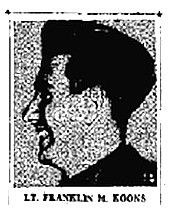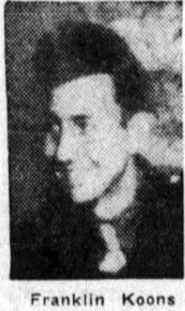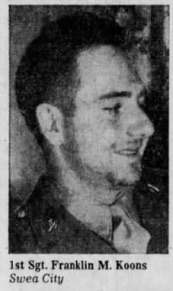
EAGER TO GO
Swea City, IA. (AP) — Corp. Franklin M. Koons wanted to get to Germany just as fast as he could, friends here recalled Saturday.
Publisher Ray Sperbeck of the Swea City Herald described Koons as a “fine lad” and something of an athlete. He is the son of Mr. and Mrs. O. B. Koons, farmers. He joined the Army in 1941.
Source: Des Moines Tribune, August 22, 1942 (photo included)
![]()
“Zip” Koons Is Pride of Swea City
LONDON, (U2) – The first American soldier to fire a shot for liberty on European soil in World war II was revealed Monday to be Corp. Franklin Koons, a 23-year-old farmer from Swea City, Iowa.
SWEA CITY -- “I’m not doing much today. We’re listening to the radio. I feel that Zip is in the thickest of this.”
That’s the way O. B. Koons, farmer four miles north of Swea City and father of Marion
Franklin “Zip” Koons, felt on the day newspapers announced the raid on Dioppe in which American Rangers participated.
The following day it was announced that “Zip” had been a member of the Rangers in action. And, as the postoffice opened for business that morning, A. J. Collins appeared at the window selling war bonds and said proudly, “A hundred dollar war bond, please, honoring one Ranger – ‘Zip’ Koons.”
Marion acquired the nickname “Zip” back in his grade school days because even then he was “plenty full of zip.” Described throughout the community as “a likable chap,” Zip had studied to be an auctioneer and assisted in crying sales for several months before entering the service.
He enlisted in the army in 1941 and was first trained at Camp Claiborne.
* * *
On the Columbus Broadcasting company’s radio program, “The Spirit of ’42,” heard over KGLO Sunday afternoon Corporal Koons paid particular tribute to the fighting courage of his British comrades.
He told in the interview form England of the return of the raiding party to its boats by way of an apple orchard. “The English were just reaching up, picking apples and eating them all the way back,” he said. “The Germans were still shooting at us.”
When he remarked at their coolness, one of the Englishmen told him: “You won’t be bothered either after you’ve been on a couple of these raids.”
The North Iowan did not hesitate to admit that he was frightened and said he was impressed by the fact that life seemed to go on about them as usual.
***
“I saw two Germans in a field carrying a stretcher and since I wasn’t going to fire on anyone helping the wounded, I just watched them. Pretty soon I realized that it was just a cow grazing. It reminded me of Iowa.”
He said the French people also went on about their business stopping when they could watch the show. As they were on their way back to their boats they passed a group of French women, he recalled. He stopped and, with one of his French comrades translating, made a little speech for them assuring them that he was an American and that this was the only first of many raids on the continent which would end in liberating France.
Source: The Globe Gazette, Mason City, IA, August 24, 1942
Source: Quad City Times, Davenport, IA, August 24, 1942 (photo included)
![]()
“Zip Koons Day” Being Planned
SWEA CITY – A “Zip Koons Day” was in the making here Tuesday to honor Marion Franklin Koons, the American Ranger reported from London Monday to be the first American soldier to fire a shot on European soil in World War II.
Although the date has not been set for the celebration, present plans call for the closing of all stores in Swea City and beginning the “party” at 5:30 p.m. A program of music and speakers is being arranged to follow a picnic supper for the entire community in Reynolds park.
Source: The Globe Gazette, August 25, 1942 (photo included)
![]()
ZIP KOONS DAY TO BE MONDAY
Swea City to Meet for Supper, Hold Parade, Bond Sale
SWEA CITY – The “Zip Koons Day” celebration honoring Franklin Marion “Zip” Koons will be held here Monday, it was announced Thursday.
The entire community will gather in Reynolds park at 5:30 Monday afternoon for a basket supper. Following the supper, a dedication of the service flag for Swea Cityans in service will take place. Eighty-two names are on the honor roll, including one woman, Lieut. Mae Peterson, an American Red Cross nurse serving in the army.
“Bring Your Scrap Iron” will be the theme of the parade to be held during the celebration and an honor roll of bond purchasers will be featured. War bond will be sold at the park and at the Iowa theater.
Ice cream and coffee will be served at the park by the American Legion auxiliary. Mrs. Carl Anderson, president, is directing the auxiliary work.
Designs Cachet Honoring Koons
SWEA CITY – Ida E. Larson, postmaster here, has designed a special cachet for first-day covers honoring Franklin “Zip” Koons and other men serving with the military forces. The cachet features a portrait of Koons and a press association news story announcing that he was the first American to fire a shot on European soil in this war. Cancellations will be Aug. 31 and Victory stamps will be used on the envelopes. Those desiring cancellations can write to the postmaster here, enclosing 6 cents for the stamp and cachet envelope.
Source: The Globe Gazette, Mason City, Iowa, Monday, August 27, 1942
![]()
‘ZIP’ KOONS CITED AGAIN
LONDON, (U.P.) – Corp. Franklin M. Koons, the first American soldier to fire a shot in Europe in World War II, came forth Wednesday with another claim to fame – that he has gone farther inland in European combat operations than any other doughboy in the current conflict.
The black-haired, 23-year-old youth from Swea City, Iowa, penetrated a mile into the continent during the recent Dieppe raid and I believed to have shot more German soldiers than any other American.
Koons, the first American solider decorated by the British as a result of the Dieppe attack, modestly admitted he did not know how many Germans he had killed but added, “chum, I got a lot through my sights and didn’t have time to count them.”
Koons, along with a British soldier, fought a rearguard action while their comrades withdrew and it was for this that he received the British military medal.
Koons has just received a letter from his parents telling of a big celebration staged at Swea City when they learned he had won the medal.
“My Pop said the whole town turned out to celebrate, and bought $30,000 worth of war bonds,” Koons added.
When an officer asked the youth how many notches he had in his rifle, he replied:
“I don’t deface United States government property, sir.”
Koons was ashore for four hours during the Dieppe operations. He said that just as soon as he was ashore, he heard the warning in German, French and English – “Beware of Mines.”
Koons said:
“Brother, we didn’t have time to look out for mines, I just squeezed my rifle and went in against those Jerries.”
Iowans with the 1st Battalion Rangers participating in the Dieppe Raid included:
First Lieutenant Leonard F. Dirks; Sergeant Harold R. Adams, A Company; Staff Sergeant Gino Mercuirali, D Company; Corporal Franklin M. Koons, D. Company; Staff Sergeant Lester E. Kness, E Company; Sergeant Lloyd N. Church, A Company, Sergeant Albert T. Jacobsen, B Company; Sergeant Edwin C. Thompson, F Company; Sergeant Dick Sellers, C Company; PFC Donald L. Hayes, B Company; PFC Clare P. Bietel, E Company; PFC Charles R. Coy, E Company; and Pvt. Don A. Earwood, F Company.
Source: The Globe-Gazette, Mason City, Iowa, Wednesday, October 08, 1942
![]()
ON LEAVE FROM ANZIO BEACHHEAD, CHESHER VISITS SWEA CITY
For the second time in the same week the Swea City community has been visited by a member of the American Rangers. First Sgt. Franklin (Zip) Koons, hero of the Dieppe raid, left Thursday after coming home to take a bride, the former June Anderson. On Friday evening the crowd at the high school commencement exercises saw another tall, sun-bronzed soldier with the insignia of the American Rangers on his sleeve. He was First Sgt. Robert T. Chesher, who with his wife, the former Gladys Paulson, is visiting at the parental Axel Paulson home northeast of town.
In Mediterranean Two Years
Sgt. Chesher, a member of the 4th Rangers battalion, is in the States on furlough after having been in action in the Mediterranean area for over two years. At first a member of the 1st Ranger Batalion (Zip Koons’ outfit, though a different company) Sgt. Chesher took part in the Tunisian campaign. While still in Africa, he was transferred to his present battalion. During action in Italy last November, he was wounded. This took place, ironically enough, on Armistice day, Nov. 11, and occurred while our forces were attempting to cross the Volturno river. He was hospitalized from Nov. 12 to Dec. 30, and then returned to the front. At the time he was given his furlough, March 26, he was taking part in the landing at the Anzio beachhead.
Saw Albert Paulson in Italy
He and his 18 year old brother-in-law, Albert Paulson, were indirectly participating in the same action, and it was there that Albert received wounds which resulted in his being hospitalized. Sgt. Chesher visited Albert at a hospital in the Naples area shortly before sailing from Italy on April 7, and brings reassuring word to the home folks concerning Albert’s progress.
Sgt. Chesher arrived in the States on May 3, and he and his wife are spending some time here. Mrs. Chesher’s sister, Mildred Paulson, was one of the graduating class at the Swea City commencement exercises Friday night.
On June 6, Sgt. Chesher is to report at Camp Hood, Texas, for further orders.
Source: The Algona Upper Des Moines, Tuesday, May 23, 1944
![]()
KOONS READY FOR SECOND ARMY “HITCH”
SWEA CITY – 1st Lt. Franklin M. “Zip” Koons is home this week on a pre-embarkment leave, his [illegible] of the 154th of the national guard being scheduled August 20 from New Jersey for Bremerhaven, Germany. Batteries from Spencer, Estherville, Mapleton and Humboldt have been in training at Camp McCoy, Wis., for the past year.
This is “Zip’s” second “hitch” with the army in Europe. He received worldwide publicity in August, 1942 as one of the American Rangers taking part in the raid on Dieppe, France. He was the first American soldier in World War II to fire on enemy soil. He ws then promoted to corporal.
Since his discharge following the close of the war, Lt. Koons has been in the oil business and his wife, the former June Anderson of East Chain, Minn., and son, Mike, will remain here during his absence. Zip is a member of the Estherville battery of the 154th national guard unit.
Source: The Globe-Gazette, Mason City, Iowa, Tuesday, August 14, 1951
![]()
They Fought in the Bloodiest Battles of World War II
By Nick Lamberto
Many of them came from Iowa communities; some had never traveled beyond the next farm or a neighboring city or town before they joine the Army.
But before the end of World War II, these same men – members of the U.S. Army Rangers – had participated in seven invasions, leaving a trail of bravery and blood from the sands of North Africa and the scraggy cliffs of Normandy to the jungle trails of Luzon in the Phillippines.
[excerpted]
Killed in Italy.
The Rangers trained under the British commandos with intensive schedules laid down by Col. William O. Darby, a West Point graduate credited with organizing the First Ranger Battalion in Northern Ireland June 19, 1942. Darby was killed in Italy in 1944, two days before all enemy forces in Italy surrendered.
Enemy Fire.
The Rangers’ first taste of combat came on Aug. 19, 1942, when 51 of them were among the 5,000 Allied troops, mainly Canadians, who went ashore at Dieppe, France, in the face of intense enemy fire. At least four Iowans were on the Dieppe raid – Leonard Dirks of Akron, Lester E. Kness of Des Moines, Franklin M. (Zip) Koons of Swea City, and Gino Mercuriali of Cedar Rapids.
Koons was credited with being “the first American soldier in the Second World War to kill a German soldier in Europe.” Three Rangers died at Dieppe. Of 5,000 troops sent on the raid, 3000 did not return. At total of 1,131 Allied servicemen were killed.
Source: The DesMoines Register, Sunday, July 27, 1975 p. 21 (photo included)
![]()
OBITUARY ~ FRANKLIN M. “ZIP” KOONS
January 24, 1919 ~ October 06, 2006
Franklin M. "Zip" Koons was born January 24, 1919 to Oliver and Lotte (Gettman) Koons in Harrison Township near Swea City, Iowa. He died Friday, October 6, 2006 at Fairmont Medical Center in Fairmont, Minnesota at the age of 87. Frank attended schools in Harrison and Grant Townships and graduated from Grant Consolidated High School in 1938.
On May 6, 1941, Frank submitted to Selective Service for induction in the Army. He was sent to Camp Claiborne, LA for basic and continued training. On December 7, 1941, he was sent out to guard for Homeland Security with the start of WWII. On January 14, 1942, he was sent to European Theaters of Operation and assigned duty with the Navy to guard military installations. June 1, 1942 he volunteered for service with Special Forces.
On June 6, he was accepted to try out and on June 19th became a member of the First Ranger Battalion. July 1, 1942 Frank began his training under the supervision of the British Commandos. August 1, 1942 he was assigned to the unit, British Commando #4 who were in the vicinity of Weymouth and Portland on the south coast of England. On August 18 and 19, 1942, #4 British Commandos under Canadian Command attacked the port city of Dieppe, France as part of a larger raiding force. Their actions ended up being the only successful operation of the raid. They were the first 50 US Army Rangers to engage the Germans.
After the raid, Frank returned to his unit, Company D, First Ranger Battalion and on November 8, 1942 was part of the allied invasion of North Africa. In January of 1943 he fought in the Tunisian Campaign, July 10, 1943, the Sicilian Campaign and September 9, 1943, the Italian Campaign.
On November 16, 1943 he was ordered to return to the United States, arriving in Swea City on January 1, 1944. On May 13, 1944 Frank was united in marriage to June Anderson at her family farm near East Chain, Minnesota. In January 1945 he returned to the European Theater of Operations and participated in the Central Europe Campaign until May 8, 1945. In August of 1945 he was sent to the Asiatic Theater of Operations.
After the War ended, he returned to the United States and in February of 1946 he was discharged from active duty and entered the Army Reserves. In 1948, he joined the National Guard and transferred to the Artillery. On September 11, 1950 he was called back to active duty and sent to the Army of Occupation in Germany. On May 22, 1952 Franklin M. Koons was discharged from the Army.
Frank was awarded the following medals and awards for his service in the Army during WW II: the British Military Medal by King George VI of the United Kingdom; the Silver Star by General George S. Patton Jr; Bronze Star Medal by the Secretary of the Army; Canadian Dieppe Medal by the Dieppe Veterans and Prisoners of War Association; Letter of Commendation by Lt. Col Elmer P. Lindhart and direct commission to 2nd Lieutenant by Col. William O. Darby. He moved through the ranks from Private to 1st Sergeant, finishing his Army duty as a 1st Lieutenant.
From 1952 to 1980 Frank farmed near Swea City, Iowa. It was during this time that he continued his education in accounting and business. In 1969, he was employed as a banker at First Trust and Savings Bank in Armstrong, eventually becoming a vice president. He continued to farm part time until 1980. He oversaw the development of the Suburban Estates Golf Course in Armstrong and owned it for 10 years until 1984. In 1993, Frank and June moved to Fairmont, MN. June passed away July 3, 2005.
Frank was a longtime member of the First Baptist Church in Swea City where he was a choir member in the past and held various church offices. He also served on the Kossuth County Selective Service Board for 5 years during the Viet Nam Conflict.
Frank is survived by one son, Michael Koons and his wife, Cathy of Fairmont; grandson, Jeffrey Koons and his wife, Tara of Maplewood, MN and granddaughter, Michelle Neuman and her husband, Bruce of Manitowoc, WI; 5 great grandchildren, Mitchell, Carter, Ciaradh, Niamh and Izabel. Also surviving are two brothers, James Koons and his wife, Iris of Swea City and Donald Koons and his wife Lorraine of Estherville, one sister, Dorothy Christ and her husband, Mike of Lakota and a number of nieces and nephews.
He was preceded in death by his wife, parents and two sisters, Violet and Lois.
Frank was laid to rest at Harrison Township Cemetery, Swea City, with military rites conducted by the Iowa National Guard.
Source: Henry Olson Fuhrman Funeral Home obituary
![]()



